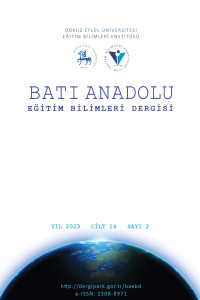Üniversite öğrencileri için Kariyer Arzusu Path (Yol) Modelinin Kariyer Yapılandırma Kuramındaki Uyum Modeli Kapsamında Test Edilmesi
Abstract
Bu araştırmanın amacı üniversite öğrencileri üzerinde kariyer arzusu path (yol) modelini kariyer yapılandırma kuramındaki uyum modeli kapsamında test etmektir. Bu amaç doğrultusunda araştırma nedensel desende tasarlanmıştır. Araştırma grubunu 203 gönüllü üniversite öğrencisi [149’u kadın (%73.4); 54’ü erkek (%26.6)] oluşturmaktadır. Veriler “Bilişsel Kontrol ve Esneklik Ölçeği”, “Kariyer Uyum Yetenekleri Ölçeği”, “Kariyer Kararı Yetkinlik Beklentisi Ölçeği ve Kariyer Arzusu Ölçeğiyle” toplanmıştır. Veri analizinde path (yol) analizi tekniği kullanılmıştır. Dolaylı etkilerinin anlamlılığının test edilmesi Bootstrap analiziyle değerlendirilmiştir. Araştırma bulgularında bilişsel esneklik ile kariyer kararı yetkinlik beklentisi arasında kariyer uyumluluğunun kısmi aracılık etkisi anlamlı olarak saptanmıştır. Ayrıca kariyer kararı yetkinlik beklentisinin kariyer uyumluluğu ile kariyer arzusu arasındaki ilişkide kısmi aracılık rolünün anlamlı olduğu belirlenmiştir. Bunlara ek olarak bilişsel esneklik ile kariyer arzusu arasında kariyer uyumluluğu ve kariyer kararı yetkinlik beklentisinin tam aracılık etkisinin anlamlı olduğu tespit edilmiştir. Sonuç olarak veriler üniversite öğrencilerin kariyer arzularını açıklamak için kavramsal çerçeve çizen kariyer yapılandırma kuramındaki uyum modeli tarafından desteklendi.
References
- Afsar, B., Umrani, W. A., & Khan, A. (2019). The impact of perceived calling on work outcomes in a nursing context: The role of career commitment and living one’s calling. Journal of Applied Biobehavioral Research, 24(1), 1-18. https://doi.org/10.1111/jabr.12154
- Allan, B. A., & Duffy, R. D. (2014). Calling, goals, and life satisfaction: A moderated mediation model. Journal of Career Assessment, 22(3), 451-464. https://doi.org/10.1177/1069072713498574
- Arnett, J. J. (2000). Emerging adulthood: A theory of development from the late teens through the twenties. American Psychologist, 55, 469–480. https://doi.org/10.1037/0003-066X.55.5.469
- Barkale-Şahin, S. (2022). Examination of university students' perceptions of the career future in terms of tolerance for uncertainty and cognitive flexibility. Journal of Career Review, 1(1), 11-23. https://doi.org/10.5281/zenodo.7492831
- Baron, R. M., & Kenny, D. A. (1986). The moderator–mediator variable distinction in social psychological research: Conceptual, strategic, and statistical considerations. Journal of Personality and Social Psychology, 51(6), 1173-1182. https://doi.org/0022-3514/86/S00.75
- Betz, N. E., Klein, K. L., & Taylor, K. M. (1996). Evaluation of a short-form of career decision making self-efficacy scale. Journal of Career Assessment, 4(1), 47- 57. https://doi.org/10.1177/106907279600400103
- Bott, E. M., Duffy, R. D., Borges, N. J., Braun, T. L., Jordan, K. P., & Marino, J. F. (2017). Called to medicine: Physicians’ experiences of career calling. The Career Development Quarterly, 65(2), 113-130. https://doi.org/10.1002/cdq.12086
- Chen, H., Liu, F., & Wen, Y. (2022). The influence of college students’ core self-evaluation on job search outcomes: chain mediating effect of career exploration and career adaptability. Current Psychology, 1-12. https://doi.org/10.1007/s12144-022-02923-4
- Wang, F., Xu, Y., Zhou, X., Fu, A., Guan, Y., She, Z., Wang, Z., & Bi, Y. (2022). Are adaptable employees more likely to stay? Boundaryless careers and career ecosystem perspectives on career adaptability and turnover. Applied Psychology, 71(4), 1326– 1346. https://doi.org/10.1111/apps.12356
- Demirtaş, A. S. (2019). Stresli durumlarda bilişsel kontrol ve bilişsel esneklik: Bir ölçek uyarlama çalışması. Psikoloji Çalışmaları - Studies in Psychology, 39(2), 345-368. https://doi.org/10.26650/SP2019-0028
- Demirtaş, A. S. & Kara, A. (2022a). Cognitive control and flexibility as predictor of career adaptability in emerging adults. Kastamonu Eğitim Dergisi, 30(2), 390-397. https://doi.org/10.24106/kefdergi.803515
- Demirtaş, A. S. & Kara, A. (2022b). Career adaptability and unemployment anxiety in turkish senior undergraduate students: the mediating role of career stress. Turkish Psychological Counseling and Guidance Journal, 12 (64) 19-33 . https://doi.org/10.17066/tpdrd.1095894
Abstract
References
- Afsar, B., Umrani, W. A., & Khan, A. (2019). The impact of perceived calling on work outcomes in a nursing context: The role of career commitment and living one’s calling. Journal of Applied Biobehavioral Research, 24(1), 1-18. https://doi.org/10.1111/jabr.12154
- Allan, B. A., & Duffy, R. D. (2014). Calling, goals, and life satisfaction: A moderated mediation model. Journal of Career Assessment, 22(3), 451-464. https://doi.org/10.1177/1069072713498574
- Arnett, J. J. (2000). Emerging adulthood: A theory of development from the late teens through the twenties. American Psychologist, 55, 469–480. https://doi.org/10.1037/0003-066X.55.5.469
- Barkale-Şahin, S. (2022). Examination of university students' perceptions of the career future in terms of tolerance for uncertainty and cognitive flexibility. Journal of Career Review, 1(1), 11-23. https://doi.org/10.5281/zenodo.7492831
- Baron, R. M., & Kenny, D. A. (1986). The moderator–mediator variable distinction in social psychological research: Conceptual, strategic, and statistical considerations. Journal of Personality and Social Psychology, 51(6), 1173-1182. https://doi.org/0022-3514/86/S00.75
- Betz, N. E., Klein, K. L., & Taylor, K. M. (1996). Evaluation of a short-form of career decision making self-efficacy scale. Journal of Career Assessment, 4(1), 47- 57. https://doi.org/10.1177/106907279600400103
- Bott, E. M., Duffy, R. D., Borges, N. J., Braun, T. L., Jordan, K. P., & Marino, J. F. (2017). Called to medicine: Physicians’ experiences of career calling. The Career Development Quarterly, 65(2), 113-130. https://doi.org/10.1002/cdq.12086
- Chen, H., Liu, F., & Wen, Y. (2022). The influence of college students’ core self-evaluation on job search outcomes: chain mediating effect of career exploration and career adaptability. Current Psychology, 1-12. https://doi.org/10.1007/s12144-022-02923-4
- Wang, F., Xu, Y., Zhou, X., Fu, A., Guan, Y., She, Z., Wang, Z., & Bi, Y. (2022). Are adaptable employees more likely to stay? Boundaryless careers and career ecosystem perspectives on career adaptability and turnover. Applied Psychology, 71(4), 1326– 1346. https://doi.org/10.1111/apps.12356
- Demirtaş, A. S. (2019). Stresli durumlarda bilişsel kontrol ve bilişsel esneklik: Bir ölçek uyarlama çalışması. Psikoloji Çalışmaları - Studies in Psychology, 39(2), 345-368. https://doi.org/10.26650/SP2019-0028
- Demirtaş, A. S. & Kara, A. (2022a). Cognitive control and flexibility as predictor of career adaptability in emerging adults. Kastamonu Eğitim Dergisi, 30(2), 390-397. https://doi.org/10.24106/kefdergi.803515
- Demirtaş, A. S. & Kara, A. (2022b). Career adaptability and unemployment anxiety in turkish senior undergraduate students: the mediating role of career stress. Turkish Psychological Counseling and Guidance Journal, 12 (64) 19-33 . https://doi.org/10.17066/tpdrd.1095894
Details
| Primary Language | Turkish |
|---|---|
| Subjects | Other Fields of Education |
| Journal Section | Articles |
| Authors | |
| Early Pub Date | December 26, 2023 |
| Publication Date | December 28, 2023 |
| Submission Date | January 20, 2023 |
| Published in Issue | Year 2023 Volume: 14 Issue: 2 |


